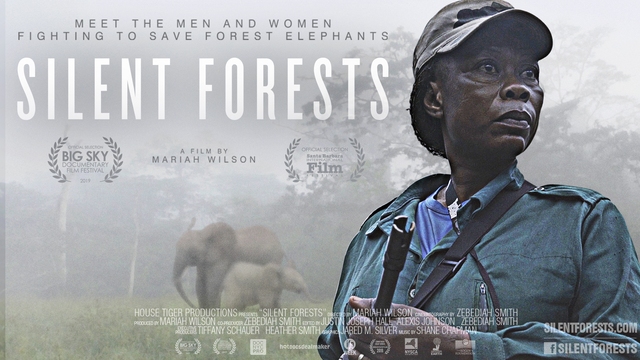Silent Forests
A rare glimpse inside the forest elephant poaching crisis
 More than half of the Central-African forest elephant population has been decimated by poachers in the last decade. Following one of Cameroon’s first female eco-guards, a grassroots law enforcement group, a Congolese biologist, a reformed poacher and a Czech activist, this intimate portrait gains remarkable access to an under-reported region, the Congo Basin, to understand the global poaching and ivory trade crises we face.
More than half of the Central-African forest elephant population has been decimated by poachers in the last decade. Following one of Cameroon’s first female eco-guards, a grassroots law enforcement group, a Congolese biologist, a reformed poacher and a Czech activist, this intimate portrait gains remarkable access to an under-reported region, the Congo Basin, to understand the global poaching and ivory trade crises we face.
 Festivals
Festivals
 The 2020 World Wildlife Day Film Showcase - Award Winner
The 2020 World Wildlife Day Film Showcase - Award Winner
 Big Sky Documentary Film Festival - Feature Competition Finalist
Big Sky Documentary Film Festival - Feature Competition Finalist
 Santa Barbara International Film Festival - Official Selection
Santa Barbara International Film Festival - Official Selection
 Brooklyn Film Festival - Spirit Award Winner
Brooklyn Film Festival - Spirit Award Winner
 Taos Environmental Film Festival - Official Selection
Taos Environmental Film Festival - Official Selection
 Melbourne Documentary Film Festival - Official Selection
Melbourne Documentary Film Festival - Official Selection
 DC Environmental Film Festival - Official Selection
DC Environmental Film Festival - Official Selection
 San Francisco Green Film Festival - Official Selection
San Francisco Green Film Festival - Official Selection
 Freeland Film Fest - Official Selection
Freeland Film Fest - Official Selection
 Matsalu Nature Film Fest, Estonia - Official Selection
Matsalu Nature Film Fest, Estonia - Official Selection
 Rwanda Film Festivala - Nominated Best Documentary
Rwanda Film Festivala - Nominated Best Documentary
 African International Film Festival - Nominated Best Documentary
Reviews and More
African International Film Festival - Nominated Best Documentary
Reviews and More“This powerful documentary expertly highlights the need for wildlife conservation and the strengthening of law enforcement efforts. It is a powerful example of our intrisic relationship with the planet and resonates globally, in a refreshing and deeply meaningful way.” – One World Media “...succeeds in bringing us closer to the reality of the crisis, rescuing it from the realm of abstraction.” – Santa Barbara Independent “...Casts an understated yet heroic glow over the people fighting elephant poaching at the forefront... Tempers one’s feelings of anger and injustice with a sense of hope that the people of the region are up for the fight.” – Screen Space “A heart-rending but hope-inspiring documentary.” – Supamodu Watch a Q&A with director Mariah Wilson and producer/cinematographer Zebediah Smith at Santa Barbara International Film Festival here. Listen to Mariah speaking about the film on the Creative Cast Podcast here. Read an interview with Mariah on Directed By Women here. Watch our Q&A with director Mariah Wilson on the making of her film here. To learn more and support the conservationists, head to the film's website here.







